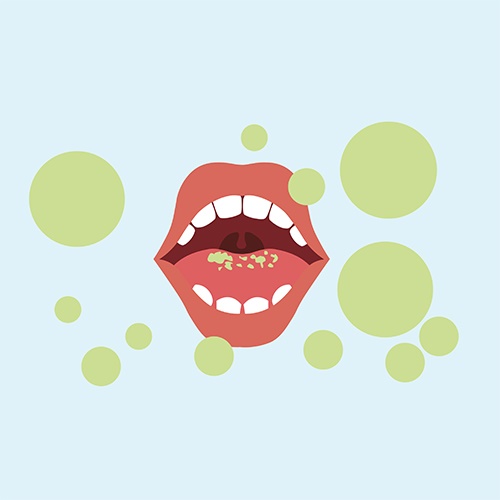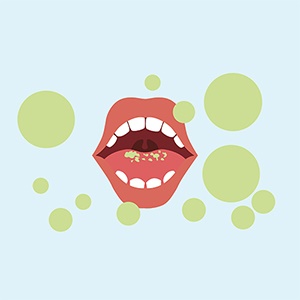

If you have a bout of bad breath, popping a mint, brushing your teeth or chewing some gum should help. With halitosis though, it's going to take more work than that.
What is halitosis?
- Chronic bad breath that can't be solved with a quick fix like teeth brushing or mints.
- About 90% of the population has bad breath every once in a while.
- About 25% of all adults suffer from halitosis on a regular basis, and 40% suffer from chronic halitosis.
- Brushing, flossing and mouth rinsing provides only temporary relief instead of eliminating the problem.
What causes halitosis?
Over 20% of chronic cases of halitosis are caused by odours coming from the lungs, alimentary tract, tonsils, adenoids etc. due to medical conditions.
Bad breath is most commonly caused by naturally-occurring bacteria in the mouth. These bacteria thrive in dark, oxygen-poor environments like your gums and the back of your tongue. About 50% of these bacteria thrive in the back of the mouth, under the tastebuds, and on the back of the tongue. The tastebuds, or papilla, are shaped like tiny mushrooms and provide protective cover for the bacteria to grow.
Diet and dieting may also cause halitosis. Bacteria thrive on proteins like milk, cheese and most other dairy products. Watch out for fish too. Other oral factors include food stuck between teeth, old and defective fillings, cavities, diseases of the dental pulp, oral candidiasis, throat infections, and unclean false teeth.
Symptoms and signs
- A white coating on the surface of the tongue.
- A sour, bitter or metallic taste related to higher acid levels in the mouth.
- Dryness in the mouth, extreme “morning breath”, or evidence of thicker saliva.
- High levels of postnasal drip or mucus in the throat.
- An increase in bad breath after eating certain foods, using mouthwashes or hormonal therapies, or during the menstrual cycle.
Can halitosis be prevented?
Halitosis can be prevented in most cases. To combat bad breath, make sure that your oral hygiene is excellent. Visit the dentist regularly for teeth- cleaning, and brush your teeth and tongue at least twice daily. Scrape or brush the back of your tongue regularly to get rid of odour-causing bacteria.
Floss every day to remove food particles from between teeth and to prevent build-up of plaque at the gum line. Use an oral rinse or “mouthwash”, but only to provide extra freshness, not to mask odours which must be removed with other measures. Mouthwash is only effective for a short period, and mouthwashes containing alcohol aggravate the problem.
If you wear false teeth, be aware that they’re frequently the source of foul odour. Clean your false teeth regularly and thoroughly to prevent odour-causing substances from accumulating. Brush at least twice a day with a pea-size drop of fluoride toothpaste or gel.
How is halitosis treated?In the past, bad breath was often considered to be incurable. Not so anymore. If the back of the tongue is the problem, a dentist can recommend a method of cleaning the area, either with a toothbrush or a specially designed tongue scraper.
Clean the back of your tongue thoroughly yet gently, to prevent mouth sores. Your dentist may recommend dental treatment if there are other areas like cavities in which bacteria and food can become trapped and cause odour.
Dos and don’ts
- Visit your dentist regularly.
- Have your teeth cleaned periodically by a dental professional.
- Floss between your teeth. Use unscented floss so you can detect those areas between your teeth that give off odours, and clean them more carefully.
- Ask your dentist to recommend a toothbrush or scraper for your tongue. Clean your tongue all the way back gently, but thoroughly.
- Drink plenty of liquids.
- Chew sugar-free gum for a minute or two at a time, especially if your mouth feels dry. Parsley, mint, cloves or fennel seeds may also help.
- Clean your mouth after eating or drinking milk products, fish and meat.
- False teeth should be brushed daily using dishwashing liquid (the same that you use to clean knives and forks) and a soft brush. Have stains or tartar on the teeth professionally cleaned.
- If someone in your family or a close friend has bad breath, find a kind way of letting them know.
- Ask your dentist to recommend a mouthwash that’s clinically effective in fighting bad breath, and use it just before going to sleep.
- Eat fresh, fibrous vegetables like carrots.
- Don’t drink too much coffee; it may make the situation worse.
- Don’t forget to clean behind the back teeth in each row.
- Don’t brush your tongue with regular toothpaste; it’s better to dip your toothbrush in mouthwash for tongue cleaning.




 Publications
Publications
 Partners
Partners












